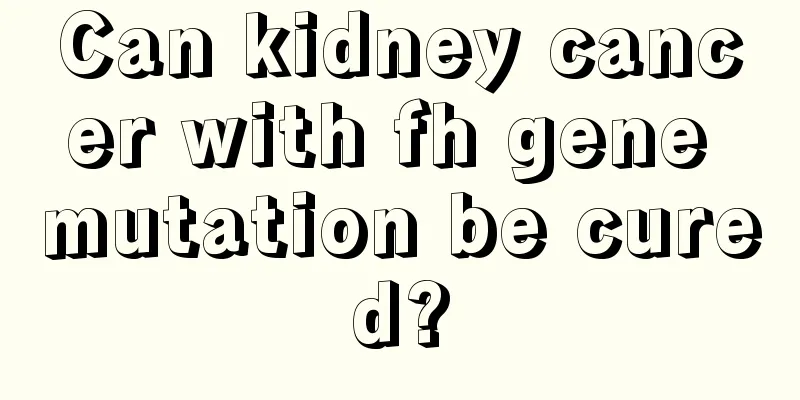Can kidney cancer with fh gene mutation be cured?

|
The treatment of renal cancer with FH gene mutation requires a personalized plan based on the patient's specific situation. Early detection and comprehensive treatment can improve the cure rate. Treatment methods include surgical resection, targeted therapy and immunotherapy, combined with genetic counseling and regular follow-up. 1. Surgical resection is the main treatment for FH gene mutation renal cancer, which is suitable for patients in the early and locally advanced stages. Radical nephrectomy is the standard procedure, which can completely remove tumor tissue. For some patients, nephron-preserving surgery is also an option to help protect renal function. Close monitoring is required after surgery to prevent recurrence. 2. Targeted therapy targets metabolic abnormalities caused by FH gene mutations and inhibits tumor growth by inhibiting specific signaling pathways. Commonly used drugs include mTOR inhibitors and HIF-2α inhibitors, which can effectively control tumor progression. During treatment, it is necessary to monitor drug side effects and adjust the dosage in a timely manner. 3. Immunotherapy activates the patient's own immune system to attack tumor cells and is suitable for patients with advanced or metastatic disease. PD-1/PD-L1 inhibitors are commonly used drugs that can improve patient survival. Biomarker testing is required before treatment to screen suitable patients. 4. Genetic counseling is crucial for patients with renal cancer and their families with FH gene mutations, and helps to understand the genetic risk of the disease. Genetic testing is recommended to clarify the mutation type and inheritance pattern. For patients with fertility needs, preimplantation genetic diagnosis can be considered to reduce the risk of disease in offspring. 5. Regular follow-up is an important part of the management of renal cancer with FH gene mutation, which helps to detect recurrence or metastasis at an early stage. Follow-up includes imaging examination, laboratory examination and clinical symptom assessment. It is recommended to conduct a comprehensive examination every 3-6 months for more than 5 years. The treatment of renal cancer with FH gene mutation requires multidisciplinary collaboration, combining multiple methods such as surgery, targeted therapy and immunotherapy, while paying attention to genetic counseling and long-term follow-up to improve treatment efficacy and patient quality of life. |
<<: Will thyroid cancer cause throat pain?
>>: What kind of tumor is nasal bone tumor?
Recommend
Symptoms of mental distress?
Mental stimulation can cause symptoms such as int...
Laparoscopic postoperative care for gastric cancer
The health of a person's stomach directly aff...
What are the precautions for exercising with lymphoma
Cancer treatment is a long process. In order to t...
my country's colorectal cancer screening program
The high-risk factors for colorectal cancer in my...
Swollen and painful lymph nodes in the neck
Diseases are very harmful to human health. When y...
What's going on with milk powder stratification
We all know that almost every household will prep...
Normal renal function with urine protein
The kidneys are very important organs in the huma...
What should I do if I smell a bad odor?
Human beings are particularly sensitive creatures...
What should we do if we are prone to breast cancer? These three groups of people are more likely to develop breast cancer
Breast cancer has always been a hot topic, and th...
How many years can a person with cervical cancer usually live
The prognosis of cervical cancer varies depending...
What are the special treatments of traditional Chinese medicine for lung cancer? What are the non-drug treatments for lung cancer pain?
What are the special treatments of lung cancer in...
Is papillary thyroid cancer serious? What are the symptoms of papillary thyroid cancer?
Compared with benign tumors, papillary thyroid ca...
How to remove static electricity from cars in winter
Static electricity is mostly generated when the w...
Drinking too much water can easily cause bladder cancer? Eating three oysters a day can prevent cancer
Bladder cancer is not something we often hear abo...
How to remove oil stains from clothes
How to remove oil stains from clothes? Oil stains...









